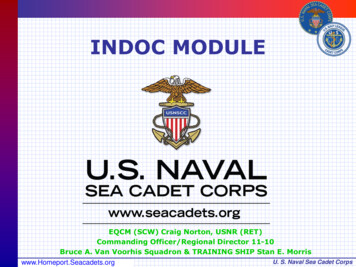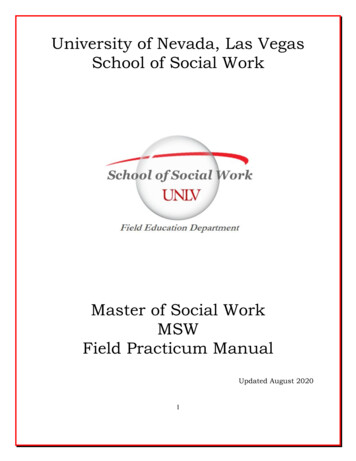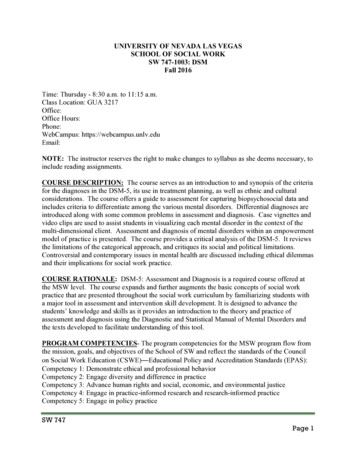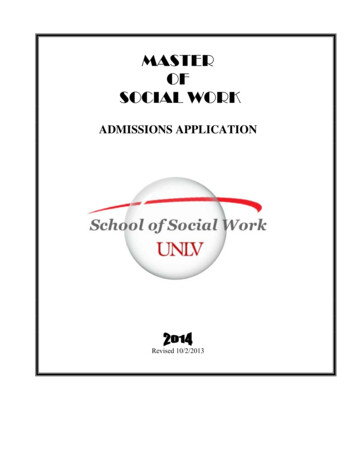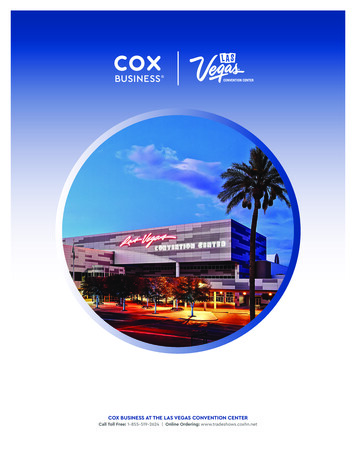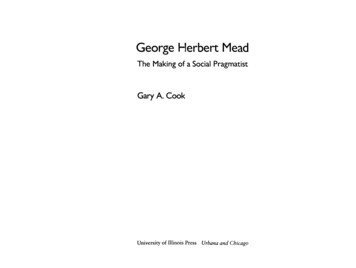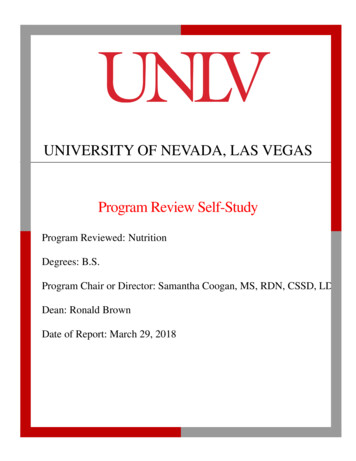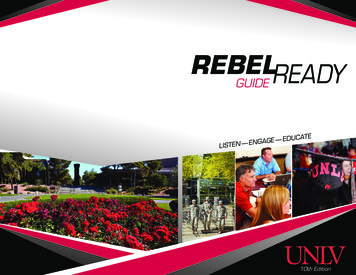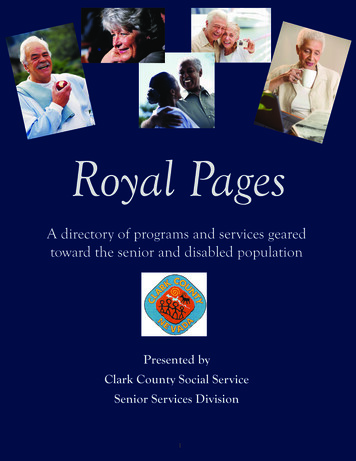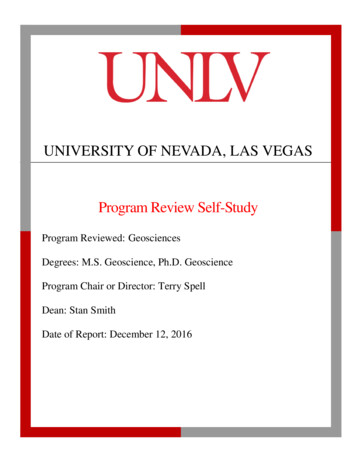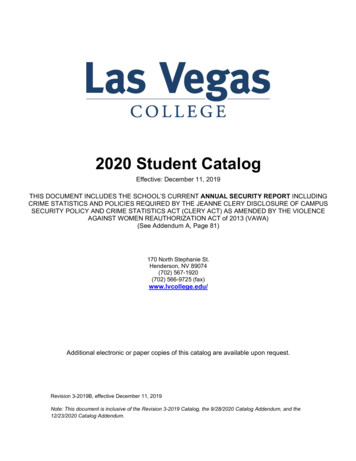
Transcription
2020 Student CatalogEffective: December 11, 2019THIS DOCUMENT INCLUDES THE SCHOOL’S CURRENT ANNUAL SECURITY REPORT INCLUDINGCRIME STATISTICS AND POLICIES REQUIRED BY THE JEANNE CLERY DISCLOSURE OF CAMPUSSECURITY POLICY AND CRIME STATISTICS ACT (CLERY ACT) AS AMENDED BY THE VIOLENCEAGAINST WOMEN REAUTHORIZATION ACT of 2013 (VAWA)(See Addendum A, Page 81)170 North Stephanie St.Henderson, NV 89074(702) 567-1920(702) 566-9725 (fax)www.lvcollege.edu/Additional electronic or paper copies of this catalog are available upon request.Revision 3-2019B, effective December 11, 2019Note: This document is inclusive of the Revision 3-2019 Catalog, the 9/28/2020 Catalog Addendum, and the12/23/2020 Catalog Addendum.
A Message from the PresidentDear Student:It is with great pleasure that I take this opportunity to welcome you to Las Vegas College. Pursuing higher educationand training to improve one’s quality of life takes courage and is to be commended.For over 30 years, LVC has had the privilege of helping people get trained in new professions and achieving theirgoals. We have accomplished this by maintaining modern facility utilizing equipment and tools used in theprofessions, the latest instructional materials, and a faculty with real world experience. LVC curriculum is alsoreviewed on a regular basis by industry professionals to ensure that students are learning relevant information in theirchosen fields of study.We would like to extend a cordial invitation to you to visit our facility, talk with our students, and meet our instructors.Our staff and faculty are dedicated to your success.Sincerely,Peter MikhailPresident
TABLE OF CONTENTSABOUT LAS VEGAS COLLEGE .1VISION .1MISSION .1OBJECTIVES .1SCHOOL HISTORY .1FACILITIES AND EQUIPMENT .1LEARNING RESOURCE CENTER.1ACCREDITATIONS, LICENSURE ANDAPPROVALS.1ADMISSIONS INFORMATION .3GENERAL ADMISSIONS REQUIREMENTS ANDPROCEDURES .3ADMISSIONS REQUIREMENTS FOR NURSINGPROGRAMS .4CRIMINAL BACKGROUND AND DRUGSCREENING .4VACCINATION POLICY .4ACADEMIC READINESS .5ACADEMIC POLICIES .6LVC REGULATIONS .6DEFINITION OF CREDIT .6MAXIMUM CLASS SIZE .6DISTANCE EDUCATION .6OUT OF CLASS ASSIGNMENTS .6TRANSFER OF CREDIT INTO LVC .6Learning Assessments and Proficiency Exams. 7Notice Concerning Transferability of Credits andCredentials Earned at our Institution.7Transfer Credit Questions. 8GRADING SYSTEM AND PROGRESS REPORTS .8GPA AND CGPA CALCULATIONS .9STANDARDS OF SATISFACTORY ACADEMICPROGRESS (SAP) . 9Evaluation Periods for SAP/AP .9Maximum Time Frame to Complete . 9Modular/Clock Hour Program SatisfactoryAcademic Progress . 9Satisfactory Academic Progress . 10Probation & Module Repeats Due to PoorGrades . 10Probation & Module Repeats Due to PoorAttendance . 10SAP Appeal Process . 11Module Repeat . 11Maximum Time Frame . 11Financial Aid Warning . 11Financial Aid Appeal/Probation. 11Limit on Reinstatement Appeals . 12Other Policy Considerations . 12Quarter-Based Program Satisfactory AcademicProgress . 12Application of Grades and Credits to SAP . 12Academic Guidance . 13Rate of Progress toward Completion . 13Financial Aid Warning .13SAP Not Met .13Financial Aid Probation 13Academic Progress Plan . 13SAP Met Status . 13SAP Re-Entry . 14Satisfactory Academic Progress (SAP) ViolationAppeals . 14FINANCIAL GOOD STANDING . 14REFRESHER COURSES . 14Retaking Failed Coursework . 14ADD/DROP POLICY (QUARTER-BASEDPROGRAMS ONLY) .15Full Term Courses . 15Mini-Term Courses . 15Effects of Add/Drop on Financial Aid Calculation.15ATTENDANCE POLICY . 15Establishing Attendance/Verifying Enrollment 15Make-Up Hours . 16Attendance Probation . 16Attendance Records . 16Online Attendance Policy. 16LEAVE OF ABSENCE POLICY . 17Leave of Absence Requests . 17Re-Admission Following a Leave of Absence.17Extension of a Leave of Absence . 17Failure to Return From a Leave of Absence . 17Possible Effects of Leave of Absence . 18EXTERNSHIP TRAINING. 18WITHDRAWAL PROCEDURES . 18MAKE-UP WORK . 18REQUIREMENTS FOR GRADUATION . 18VETERANS EDUCATION BENEFITS . 18Prior Credit for Education and Training . 18Benefit Overpayments . 18Academic Standards for Students Receiving VABenefits. 18APPEALS POLICIES . 19Student Academic Appeals Policy . 19Assignments/Test Grades . 19Final Course Grades . 19Attendance Violations Appeals . 19FINANCIAL INFORMATION. 20STATEMENT OF FINANCIAL OBLIGATION . 20TUITION AND FEES. 20TEXTBOOKS AND EQUIPMENT . 20ADDITIONAL FEES AND EXPENSES . 20DATE OF WITHDRAWAL VERSUS DATE OFDETERMINATION (DOD). 20STUDENT’S RIGHT TO CANCEL . 20LVC REFUND POLICY . 20FINANCIAL AID – CONSUMER INFORMATION 22Primary Financing Options . 22Other Sources of Financial Assistance .23Veterans Assistance and Loans (VA) . 23
Financial Aid Processes and Information. 24Returning Title IV Funds (R2T4) . 27DRUG-FREE SCHOOLS/ DRUG-FREEWORKPLACE ANNUAL DISCLOSURES .36STUDENT SERVICES . 41ADMINISTRATIVE POLICIES . 28DISABILITY ACCOMMODATION PROCEDURE 28CODE OF STUDENT CONDUCT . 28Conduct Affecting the Safety of the CampusCommunity . 28Conduct Affecting Student Learning . 28Suspension . 29Termination. 29Limitations on Students with PendingDisciplinary Matters . 29Inquiry by the Campus Director . 29Conduct that does not Result in Suspension orDismissal . 29Conduct Resulting in Suspension or Dismissal.29STUDENT USE OF INFORMATIONTECHNOLOGY RESOURCES POLICY . 29COPYRIGHT POLICY . 30SANCTIONS . 30APPEAL PROCESS . 31RECORD OF DISCIPLINARY MATTERS. 31Notice of Student Rights . 31STUDENT GRIEVANCE PROCEDURES . 31ACCSC STUDENT CATALOG NOTICE . 32CPE STUDENT CATALOG NOTICE . 32ACCOUNT FOR STUDENT INDEMNIFICATION .32Title IX Policy & Procedures . .32Notice of Binding Arbitration and ClassAction/Collective Arbitration Waiver .33Additional Important Policies and Disclosures .35DRESS CODE . 35VOTER REGISTRATION DISCLOSURE . 35CONSTITUTION DAY POLICY . 35NOTIFICATION OF RIGHTS UNDER FERPA . 35STUDENT RECORDS . 36TRANSCRIPT AND DIPLOMA RELEASE . 36ORIENTATION . 41HEALTH SERVICES . 41HOUSING . 41STUDENT ADVISING. 41PLACEMENT ASSISTANCE . 41TEMPORARY CAMPUS CLOSING WEATHER . 41PROGRAMS OFFERED . 42MODULAR/CLOCK HOUR PROGRAMS . 43MEDICAL ASSISTANT . 43LABORATORY ASSISTANT/ECG TECHNICIAN/PHLEBOTOMIST .47MEDICAL INSURANCE BILLING AND CODING.49QUARTER-BASED PROGRAMS. 55NURSING . 55PRACTICAL NURSE . 61ACCOUNTING . 66BUSINESS DIGITAL MARKETING . 70TUITION AND FEE SCHEDULE . 74OPERATING HOURS . 75ACADEMIC CALENDARS . 75QUARTER-BASED PROGRAMS . 76ADMINISTRATION AND FACULTY. 78STATEMENT OF OWNERSHIP . 79EQUAL EDUCATIONAL OPPORTUNITY . 80APPENDIX A: 2018 LAS VEGAS COLLEGE ANNUALSAFETY AND SECURITY REPORT . 81
ABOUT LAS VEGAS COLLEGEVISIONTo provide excellent educational opportunities that are responsive to the needs of the community and to helpstudents better their lives and the lives of others.MISSIONLas Vegas College (LVC) values its diverse student population and is committed to providing professional,career-oriented higher education. These opportunities allow students to reach their personal and professional goals.Through educational rigor, faculty and staff who are dedicated to student achievement, Las Vegas College preparesgraduates for successful careers, lifelong learning, and to provide service to Las Vegas and surrounding areas.OBJECTIVESIn order to assure continued fulfillment of its mission, Las Vegas College has established the following goals andobjectives:1. Las Vegas College will continually improve its educational process at all levels and seek to impart essentialskills, competencies, and attitudes that students need for successful careers and for continued study.2. The School shall strive to develop in all students the intellectual potential that will lead them to realize theircapacities for independent thinking, intelligent decision making, and individual expression of opinions.3. Las Vegas College is committed to quality in teaching and excellence in education and to this means shallseek qualified faculty who will bring excitement to the classroom and stimulate enthusiasm and eagerness forlearning in the student.4. By providing positive role models, emotional support, and opportunities to develop new and beneficialrelationships, Las Vegas College shall strive to develop mature citizens who contribute to their communities.5. Las Vegas College will assist graduates in securing career-related employment.SCHOOL HISTORYLas Vegas College was founded by Betty Krolak in 1979 under the name Krolak Business Institute. BarbaraA. and E. T. Paulus purchased the Institute in December of 1980 and incorporated it under the name of TO-BaCorporation. The Institute was granted a license to grant Associate’s degrees on January 7, 1986, and the Institute’sname was changed to Las Vegas Business College. The College was acquired by Rhodes Colleges, Inc., a divisionof Corinthian Colleges, Inc., on October 17, 1996. At that time, the name of the institution was changed to Las VegasCollege. Las Vegas College opened a branch campus, located in Henderson, Nevada, in 2003. The main campusmoved in 2005 to the Henderson branch. The name of the college was changed to Everest College on August 10,2009.In February 2015, Zenith Education Group purchased the school from Corinthian and transitioned it from a forprofit college into a nonprofit learning institution. In August 2017, Everest College changed its name to Altierus CareerCollege.In November 2018, Nevada Career Education, Inc. purchased the school from Zenith Education Group andchanged its name to the current Las Vegas College.FACILITIES AND EQUIPMENTLas Vegas College occupies a 50,000 square foot facility, housing its classrooms, labs and administrativeoffices. Students have access to modern technology supporting their training. The facility is handicap accessible andfree student parking is available.The school, the facilities it occupies and the equipment it uses comply with all federal, state, and local, ordinancesand regulations, including those related to fire safety, building safety and health.LEARNING RESOURCE CENTERThe learning resource center is designed to support the programs offered at the campus. Students and facultyhave access to a wide variety of resources such as books, periodicals, audio-visual materials and digital resources tosupport its curriculum. The learning resource center is staffed with trained professionals to assist in the research needsof students and faculty, and it is conveniently open to meet class schedules.ACCREDITATIONS, LICENSURE AND APPROVALS Accredited by the Accrediting Commission of Career Schools and Colleges (ACCSC). The AccreditingCommission of Career Schools and Colleges is listed by the U.S. Department of Education as a nationallyrecognized accrediting agency. The Accrediting Commission of Career Schools and Colleges (ACCSC) islocated at 2101 Wilson Blvd., Suite 302, Arlington, VA, or call 703-247-4212, or visit their website atwww.accsc.org.1
Licensed by Nevada Commission on Postsecondary Education.The curriculum of the Associate of Applied Science Degree in Nursing program is approved for state licensureby the Nevada State Board of Nursing. The Nevada State Board of Nursing is located at:Nevada State Board of NursingB - 4220 S. Maryland Parkway, Ste 300Las Vegas, NV 89119(702) 486-5803; (888) 590-6726 (toll free)nursingboard@nsbn.state.nv.usThe Nursing education program is accredited by the Accreditation Commission for Education in Nursing(ACEN). ACEN is located at:Accreditation Commission for Education in Nursing (ACEN)3343 Peachtree Road NE, Suite 850Atlanta, GA 30326(404) 975-9000www.acenursing.orgApproved for the training of Veterans and eligible persons under the provisions of Title 38, United States Code.Copies of accreditation, approval and membership documentation is available for inspection at the campus. Pleasecontact the campus director to review this material.2
ADMISSIONS INFORMATIONAll admissions materials, including program disclosures and enrollment agreements are presented in English only,since all programs are taught in English. Each admissions representative conducts interviews with prospectiveenrollees in English only as the method to determine that the prospective enrollee understands and can function inEnglish. We do not make any accommodations to present materials or instruct courses in any other language. NoEnglish as a second language courses are offered by the campus.GENERAL ADMISSIONS REQUIREMENTS AND PROCEDURES High school diploma or a recognized high school graduation equivalent is required for admittance.Applicants must meet the state of Nevada immunization requirements for admissions, as described inLVC’s Vaccination policy later in this section.Applicants must prove their academic readiness by achieving the required test score(s) for their intendedprogram, as described in the Academic Readiness policy later in this section.Several programs have specific criminal background and drug screening requirements for admissions and/orin order to meet graduation requirements. Please refer to the Criminal Background and Drug Screeningpolicy later in this section for full details.Students applying to programs offering distance education classes will complete a Distance Education ApplicantReadiness Assessment, will receive the Distance Education System/Technology Requirements document andmust attend an online orientation.Applicants are informed of their acceptance status within 15 days after all required information is received andthe applicants' qualifications are reviewed.Upon acceptance into the school, applicants who are enrolling will complete an enrollment agreement.Students may apply for entry at any time. Students are responsible for meeting the requirements of the catalogin effect at the time of enrollment.Re-entry students are subject to all program requirements, policies, and procedures as stated in the schoolcatalog in effect at the time of re-entry. All re-entering students must sign a new enrollment agreement.LVC will accept the following documentation as proof of high school graduation or the equivalent: A copy of the student’s high school diploma. (See footnote 1.) A copy of the student’s final official high school transcript that shows the date when the diploma was awarded.(See footnote 1.) A copy of a General Educational Development (GED) certificate or GED transcript that indicates the studentpassed the exam. A state certificate or transcript received by a student after the student passed a State-authorized examinationthat the State in which the student took the examination recognizes as the equivalent of a high schooldiploma. This includes tests similar to the GED such as HiSET, TASC, as well as a State establishedexamination. For a student who completed secondary education in a foreign country, a copy of the “secondary schoolleaving certificate” or other similar document, accompanied by an evaluation from a third-party, professionaldocument evaluation service that clearly identifies the document’s equivalence to a U.S. high school diploma.(The School does not self-evaluate foreign secondary school credentials or other similar documents.) An academic transcript or credential from an accredited institution indicating that the student has successfullycompleted one of the following:1. An associate’s degree;2. At least 60 semester or trimester credit hours
moved in 2005 to the Henderson branch. The name of the college was changed to Everest College on August 10, 2009. In February 2015, Zenith Education Group purchased the school from Corinthian and transitioned it from a for-profit college into a nonprofit learning institution. In August 2017, Everest
